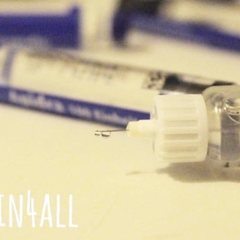
Redirecting Guilt into Action
16 Jul 2021, 10:04 a.m. in #insulin4all USA, Global Stories by Elizabeth Roosevelt
“We can discuss our technology, diabetes and Covid-19, our experiences with insulin affordability; anything you would like,” Beth, who oversees and organizes the T1International Digital Advocates, echoes through the Zoom during our Digital Advocate meet and greet.
A little embarrassed, I think to myself, “please, not our experiences with insulin affordability.”
As someone living with type one diabetes for fourteen years and a Digital Advocate for T1International since August 2020, it sounds like a conflict of interest that I wouldn’t want to share my experiences accessing insulin - a drug that saves my life each day. After all, this is a major goal of T1International: to advocate for global access to insulin.
It sounds like I shouldn’t be an advocate.
In reality, I’m just a little nervous. I am nineteen years old, was diagnosed with type one diabetes at age five, and have always lived in the United States. Growing up, I had no idea where my insulin came from, but I knew it would be there, delivered to my front door in an unassuming cardboard box with a few neon biohazard labels slapped on the top.
Every time I opened the refrigerator to grab insulin for a pump site change, a few vials of Novolog would be perfectly lined up on the top shelf. Each time I swung the cabinet open to reach for a new infusion set, the supplies were there, waiting for me. When packing for vacation, I never thought twice about having enough supplies back-stocked in my house to take with me.
When I wanted to switch from the Medtronic pump to the OmniPod, the thought that the OmniPod might be more expensive never crossed my mind. Money didn’t grow on trees, but my parents always made it happen. And for that I am eternally grateful and blessed.
So, if the other advocates started sharing their experiences with insulin affordability on that Zoom, I’m not sure what I would’ve said. That I’ve never had an issue with it? That I didn’t know insulin affordability was a pressing problem in the United States until a few years ago, when Instagram posts by Senator Bernie Sanders and diabetes influencers began to pop up on my feed, explaining that Big Pharma was killing Americans, especially those with diabetes? It was only when our country’s flawed healthcare system made headlines that I noticed I seemed to be in a position many American diabetics were not.
This ignited a spark in me. It didn’t seem fair that just because I was born into a family that could afford private insurance to cover my diabetes costs I could do just about anything a person without diabetes could do. I could study and work to the best of my ability because a high blood sugar wasn’t slowing down my mind. This prompted me to seek organizations like T1International where I could not only learn more about healthcare inequalities that impact my own community but also fight for change.
Because I’ve had access to technology that allows me to sleep through the night and insulin delivered to my doorstep, I sometimes feel like less of a person with diabetes (PWD) and guilty of my privilege. While all people with type one struggle with the condition in some shape or form, I find myself invalidating my challenges because I tell myself I have it much easier. And in many ways, I do. I’ve grown up as a privileged white person in an affluent neighborhood, sheltered from the reality that very few people have access to insulin as I do, especially under the heavy, capitalist-driven policies of the United States.
However, I’ve learned that having it easier than others is not something to be embarrassed about nor does it make me less of a PWD. Instead, it is a responsibility.
It’s crucial that those of us who have access to insulin use our platform and privilege to fight for our community and for the people with diabetes who are solely focused on surviving. We must serve as the voice for the people with diabetes who can’t use their own because they’re bogged down working three jobs and choosing between putting food on the table for their family or insulin.
Maybe this fighting takes the form of educating our friends, family members, and colleagues about the disparities in insulin access through discussion or educational posts on social media. Or maybe, it’s collecting near-empty insulin vials and diabetes supplies in your community to help provide short term relief to struggling diabetics. Or perhaps, it’s calling the offices of or requesting meetings with your districts congressional representatives to urge their support of regulating legislation.
Whichever way our fighting takes shape, we must redirect the guilt we feel over our privilege into a heightened sense of advocacy, into change, into a fire that spurs our movement forward and pushes the established healthcare system towards equality.
#insulin4all truly means for all, and until all those who need insulin have access to it, our work isn’t done.







